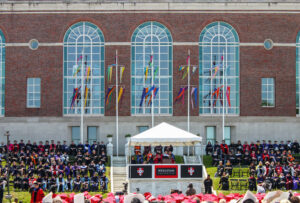

A certificate in liberal studies offers you a second chance to go back and get the liberal arts education experience you always wanted.
A liberal arts education is the cornerstone of the Western system of academics. From your earliest years in public education, you were getting the same kind of key arts and sciences training as ancient Greek and Roman scholars, and their intellectual descendants in Europe after the Dark Ages. Courses in math, reading, history, and society are all standard from kindergarten all the way up into high school.
About the time you hit high school, though, you probably started getting questions about what you were going to do with your life. The uncomfortable or exciting prospect of getting a job suddenly popped up on your radar. And you probably started hearing from teachers, advisors, and family that aiming for a useful technical education would offer you a better shot at a high-paying job out in the real world.
Unfortunately, you might have listened to them. And that may have sent you into a very technical, but very narrow kind of higher education. One where all the numbers may add up, but you’re never entirely sure why you are adding them, or where they fit into the big picture.
That’s because you skipped out on liberal studies right at the point in your life when you needed that kind of education most. A certificate in liberal studies lets you pick-up where you left off, taking into account all the college courses and life experiences you already have.
A Certificate in Liberal Studies Supports Students in Lifelong Learning
 Liberal arts certificates are often aimed at working adults and other non-traditional university students who get out into the wider world and realize they want to understand that world better. They are also offered at the community college level, a shot at preparing yourself more fully for a full college degree program. You might also find them called diplomas in general studies.
Liberal arts certificates are often aimed at working adults and other non-traditional university students who get out into the wider world and realize they want to understand that world better. They are also offered at the community college level, a shot at preparing yourself more fully for a full college degree program. You might also find them called diplomas in general studies.
What they offer isn’t the in-depth technical knowledge or training that most certificates deliver. Instead, liberal arts certificates are all about giving you a more general set of knowledge and skills that build your problem-solving and critical thinking abilities.
Following age-old ideas about how to flex the brain muscles, liberal arts certificates hit you with an interdisciplinary cocktail of ideas and knowledge.
Together with training in writing and communication, they train you how to think and communicate about any ideas, in any field. And that makes them ideal for anyone who likes to learn.
What are the Three Types of Liberal Studies Certificate Programs?
In general, you’ll find liberal studies certificate programs offered in one of three ways:
These are essentially a slice out of existing undergraduate liberal studies programs and usually encompass one of the concentrations that are offered with the parent degree. They can run from fifteen to twenty credits, taking two or three semesters to complete. They have more advanced coursework and usually more focus than the general studies programs from community colleges.
You can find certificate programs that offer a fast, introductory overview of the liberal arts. But there are also highly focused concentrations available that offer a higher level of knowledge in a specific field alongside the general liberal studies work. Your choice will depend entirely on how you want to expand your education.
The Best Liberal Arts Colleges Offer Certificates in Liberal Studies

As a rule, you won’t find liberal studies certificate programs at schools that don’t already offer a liberal arts degree at some level or other. In most cases, the certificate program will be a stripped-down version of an existing degree program, taking the same coursework and packaging it as a faster, less complete experience… for less money, naturally.
Even though almost all American universities have some basis in arts and sciences these days, it’s always more likely that you will find certificates in liberal studies at dedicated liberal arts universities. These tend to be smaller, private, and more focused on traditional arts and sciences studies than technical or research universities.
A Certificate in Liberal Studies Can Focus Your Coursework Exactly Where You Want It
The kind of classes you will find in liberal studies certificate programs are just as diverse as the kind of colleges you will find them at. They run the full spectrum, from the generic “Foundations of Liberal Studies” to the red-hot “Philosophy of Gender, Love, Sex.” That’s the field of liberal arts in a nutshell… anything you might think of that you would like to think about, there’s a class for it somewhere.
Liberal studies certificate programs don’t come with a lot of classroom hour requirements, so the curriculum is always going to be more focused than a formal degree program.
A certificate isn’t as flexible as a full degree program. Particularly at the graduate level, you’ll be able to choose from among a slate of courses, but you’re still generally restricted to six or fewer.
This usually puts certificate programs in one of two different categories:
1) Those that drill down into a particular aspect of liberal studies with a concentration. A concentration will need to include courses that give you the specific knowledge required for those studies. For example, a certificate that looks at ethics and critical thinking may have a slate of courses in:
- Ancient Philosophy
- Symbolic Logic and Reasoning
- Psychology
- Ethical Leadership
It’s a bit of a shotgun, but it gives instructors the levers they need to get through to you with the essential concepts of the topic.
2) Those that are designed to offer the core general skills of a liberal arts education. A more general certificate program is likely to contain what we think of as the core liberal arts courses. That may include classes in subjects like:
- Creative or professional writing
- Literature
- Performing arts
- Science and mathematics
- History and social studies
Tapping Into Your Potential With a Certificate in Liberal Studies
 What can you do with a certificate in liberal studies?
What can you do with a certificate in liberal studies?
That’s a big question, but it has an even bigger answer: whatever you want.
Of course, you’re going to have to put some of those new critical thinking skills to work getting all your possibilities laid out. Liberal arts are a powerful tool that can be applied in almost any role or industry, but they are definitely not a straight-line type of vocational training. “Position requires a certificate in liberal studies” is not a line you will see in any job listing, ever.
But just because roles for liberal arts certificate holders aren’t well defined doesn’t mean they don’t exist. In fact, they are everywhere, just waiting for you to apply your imagination and then apply for the position.
Maybe the best understood and most well-defined role for a liberal studies certificate is to get you ready for further studies. The kind of training you get even in a limited program will make you a better student and a more attractive candidate as you apply for other college degree programs.
Online Certificate in Liberal Studies Programs Are The Fastest Path to Interdisciplinary Education
For any kind of program that lasts less than a year, you’re really not going to want to relocate. But liberal studies certificate programs aren’t offered everywhere. That’s particularly true if you’re aiming at a particular specialization—some are so rare you might only find them at one school in the country.
On top of that, certificates are usually aimed at non-traditional students. If that’s you, then it means your life has probably stacked up some other obligations by now… kids to take to soccer practice, a career that’s already cooking, a home to make payments on.
That’s why a lot of certificates have gone the online route.
For anyone who values their time outside of school, online options are an easy call:
Some online degree programs come with some on-campus obligations. But certificates are usually completely online, which means you don’t have to be anywhere near the school you choose. That means you can pick any program, anywhere in the country, that scratches your intellectual itch.
Online programs don’t just offer location independence. They also free up your time by making use of recorded lectures, assignments that can be completed 24/7, and asynchronous classrooms where you can leave your thoughts or comments via Slack or web forums at any time of day or night
Some people worry that online programs are impersonal. But in liberal arts, you can still form tight relationships with professors and fellow students through the meeting of your minds. Video conferencing, online chats, and instant messaging all keep you plugged right into the discussion.
Online or on-campus, a certificate in liberal studies offers a fast and affordable boost to your key critical thinking and analysis skills.






